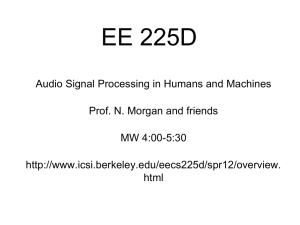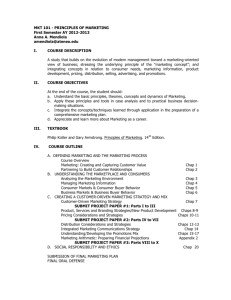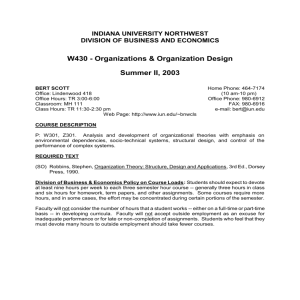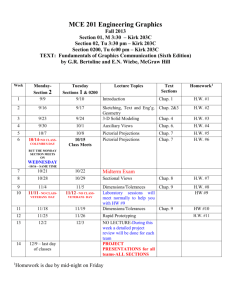Course Syllabus - CSB | SJU Employees Personal Web Sites
advertisement
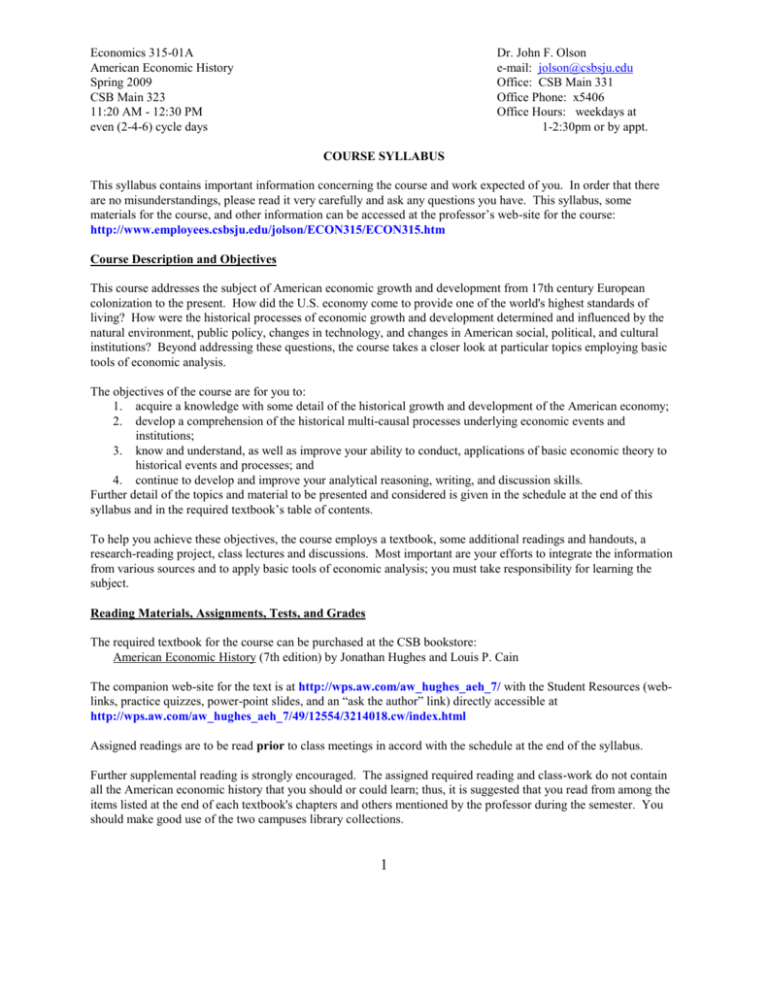
Economics 315-01A American Economic History Spring 2009 CSB Main 323 11:20 AM - 12:30 PM even (2-4-6) cycle days Dr. John F. Olson e-mail: jolson@csbsju.edu Office: CSB Main 331 Office Phone: x5406 Office Hours: weekdays at 1-2:30pm or by appt. COURSE SYLLABUS This syllabus contains important information concerning the course and work expected of you. In order that there are no misunderstandings, please read it very carefully and ask any questions you have. This syllabus, some materials for the course, and other information can be accessed at the professor’s web-site for the course: http://www.employees.csbsju.edu/jolson/ECON315/ECON315.htm Course Description and Objectives This course addresses the subject of American economic growth and development from 17th century European colonization to the present. How did the U.S. economy come to provide one of the world's highest standards of living? How were the historical processes of economic growth and development determined and influenced by the natural environment, public policy, changes in technology, and changes in American social, political, and cultural institutions? Beyond addressing these questions, the course takes a closer look at particular topics employing basic tools of economic analysis. The objectives of the course are for you to: 1. acquire a knowledge with some detail of the historical growth and development of the American economy; 2. develop a comprehension of the historical multi-causal processes underlying economic events and institutions; 3. know and understand, as well as improve your ability to conduct, applications of basic economic theory to historical events and processes; and 4. continue to develop and improve your analytical reasoning, writing, and discussion skills. Further detail of the topics and material to be presented and considered is given in the schedule at the end of this syllabus and in the required textbook’s table of contents. To help you achieve these objectives, the course employs a textbook, some additional readings and handouts, a research-reading project, class lectures and discussions. Most important are your efforts to integrate the information from various sources and to apply basic tools of economic analysis; you must take responsibility for learning the subject. Reading Materials, Assignments, Tests, and Grades The required textbook for the course can be purchased at the CSB bookstore: American Economic History (7th edition) by Jonathan Hughes and Louis P. Cain The companion web-site for the text is at http://wps.aw.com/aw_hughes_aeh_7/ with the Student Resources (weblinks, practice quizzes, power-point slides, and an “ask the author” link) directly accessible at http://wps.aw.com/aw_hughes_aeh_7/49/12554/3214018.cw/index.html Assigned readings are to be read prior to class meetings in accord with the schedule at the end of the syllabus. Further supplemental reading is strongly encouraged. The assigned required reading and class-work do not contain all the American economic history that you should or could learn; thus, it is suggested that you read from among the items listed at the end of each textbook's chapters and others mentioned by the professor during the semester. You should make good use of the two campuses library collections. 1 You are also assigned to do a research-reading project during the semester. A handout will be provided with a list of selected topics, additional details, and guidelines for this project. Due dates for this project are specified in the schedule at the end of the syllabus. An interesting and useful web site for Economic History can be found at http://eh.net/. At this site you will find Economic History course syllabi at other universities and colleges, access to an encyclopedia, on-going discussion lists involving professional economic historians on a variety of topics, some data bases, book reviews and abstracts, other information, and links to other interesting and useful sites. For any students interested in taking advantage of the student-discount subscription rates, sign-up forms for The Wall Street Journal and other economic/business periodicals are available – contact the professor if interested. There are three scheduled tests during the semester, including the final examination; dates are given in the schedule at the end of the syllabus. Tests are typically composed of questions requiring short written answers and longer essays. Make-ups are arranged only for excused absences; no make-ups are given for missed tests (or quizzes) occurring from unexcused absences. Course grades are determined by applying weights of: 35% to the grade of your best test, 25% to each grade of your other two tests, and 15% to the research-reading report. The professor reserves the right to adjust the weights so that the course grade properly reflects the student's course performance. Course Policies, Administration, and Other Matters ECON 111 (Introduction to Economics) or its equivalent is a prerequisite for enrollment in this course. If you have not fulfilled this, please see the professor. The course functions within the established institutional policies set forth in the relevant sections of the CSB/SJU catalog and student handbooks (the Bennie Book and the J-Book). All three are published and available on-line through the CSB/SJU website. Consult them and familiarize yourself with those specific policies and procedures. For example, regular class attendance is required. Absences due to illness or a college-scheduled conflict are excusable, but you are responsible for obtaining missed material and assignments made in class. You are also reminded that any work you submit must be your own with proper citations; recall that presenting another's work as your own is plagiarism and subject to severe penalties under CSB/SJU policies. The schedule of reading assignments, research-reading report due dates, test dates, and other information is on the syllabus' final pages. Assigned readings should be done before the class on that material. You are expected to bring to class any questions you have about the assigned reading, as well as to be able to demonstrate your familiarity with the assigned reading by answering and discussing questions if called upon in class. There is substantial reading for the course. Make a conscientious effort to keep up with the reading schedule – you cannot read it all the night before a test and have satisfactory comprehension. Plan ahead for the semester; use your time well and do not fall behind. If you have trouble, seek help and do not delay. I am approachable and willing to go over material again with you outside of class. My office is Room 331 in the 3rd floor Teresa Rotunda area of the CSB Main Building. My office hours for Spring 2009 are weekdays from 1-2:30pm. If these times create a conflict for you, please arrange another mutually convenient time with me. My office phone is 363-5406; please leave messages on voice mail. I can be contacted via email (at jolson@csbsju.edu). If you have problems with the course or have suggestions, please let me know. 2 Schedule of Topics and Assignments for the Semester The following is a tentative schedule for the course this semester. If any changes or adjustments need to be made, they will be made after consultation with the class. DATES TOPICS AND ASSIGNMENTS [note: H&C refers to the Hughes & Cain text] Course and Subject Introduction Jan. 13 Tu (2) 15 Th (4) first class meeting Read: course syllabus; H&C – preface, acknowledgements, introduction, & table of contents The Colonial Period, 1607-1783 19 21 23 27 M W F Tu (6) (2) (4) (6) Read: H&C – chaps. 1 & 2 Read: H&C – chap. 3 Read: H&C – chap. 4 The National Period and Constitutional Crisis, 1783-1861 29 Feb. 2 4 6 10 12 16 18 Th M W F Tu Th M W 20 F H&C – chaps. 5 & 6 H&C – chap. 7 H&C – chap. 8 Research-Reading Topic and Proposed Reading Titles H&C – chap. 9 H&C – chap. 10 (2) (4) (6) (2) (4) (6) (2) (4) Read: Read: Read: Due: Read: Read: (6) TEST # 1 24 Tu (2) 26 Th (4) CSB/SJU Spring Break March 9 M (6) no class meeting – MN Private College Job/Internship Fair Read: H&C – chap. 11 Read: H&C – chap. 12 The Rise of an Industrial Society, 1861-1914 11 13 17 19 23 25 W F Tu Th M W 27 F (2) (4) (6) (2) (4) (6) Read: H&C – chap. 13 (2) TEST # 2 31 Tu (4) April 2 Th (6) Read: H&C – chap. 14 Read: H&C – chaps. 15 & 16 Read: H&C – chaps. 17 & 18 Read: H&C – chap. 19 Read: H&C – chaps. 20 & 21 3 The Expansion of Federal Power, 1914-1945 April 6 M (2) Read: H&C – chap. 22 8 W (4) Read: H&C – chap. 23 CSB/SJU Easter Break 15 W (6) Read: H&C – chap. 24 17 F (2) Due: Research-Reading Report 21 Tu (4) Read: H&C – chap. 25 April 22nd, Wednesday, CSB/SJU Scholarship & Creativity Day 24 F (6) Read: H&C – chap. 26 The Brave New World? 1945-Present 28 Tu (2) 30 Th (4) May 4 M (6) Read: H&C – chaps. 27 & 28 Read: H&C – chap. 29 Read: H&C – chaps. 30 & 31 May 5 Tu Study Day May 7 Th TEST # 3 – 8-10am 4

